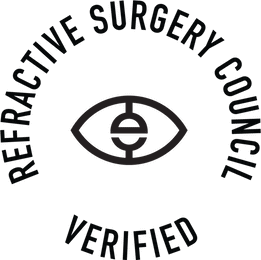How To Find Online LASIK Information You Can Trust

If you are thinking about getting LASIK you’re likely going to the internet for a bit of research. But before you enter “LASIK near me” into a Google search window, you should think about the LASIK information you are likely to get.
There are over 1.3 billion websites on the world wide web today (a number that literally grows by the minute). If you factor in social media and review sites, it is fair to say that the volume of information about LASIK and other vision correction surgeries is almost impossible to review. With virtually anyone able to launch a website on any topic, how do you know you can trust information you find online – especially when it comes to researching elective procedures such as vision correction?
And the internet is exactly where most people go when they have questions about their health and wellness. In fact, research published in 2018 reported 73 percent of patients planned to ask their doctor questions about the information they found online, and research from 2012 said about 40 percent said they brought LASIK information printed out to an appointment. It is safe to say that number has probably grown as people increasingly turn to the internet for information. To learn about vision correction options, LASIK surgeon sites are a great place to start. However, your curiosity and the work of research shouldn’t end there.
While the internet is truly an astounding resource, to become truly informed and make a confidence decision about getting LASIK or another laser vision correction procedure, you will want to make sure the sources you use to make your decision are credible and factual. The fact is, the potential for misinformation on the web is high, and that is dangerous when it comes to health matters. Nothing you find on the web is going to replace a live conversation with a surgeon specializing in vision correction procedures, but becoming educated will make that conversation much more productive. To make your research process about getting LASIK as valuable and efficient, and avoiding as much misinformation as possible, here are 10 tips:
- Friends and family members who have had a laser vision correction procedure are fantastic resources. You may start by asking for recommendations from your friends on social media – it is a great way to start; then follow up with an offline conversation with more specific questions about experience and their surgeon. Asking people you trust about their personal experience and recommendations can give you important information and insights to help you make a confident decision about getting LASIK or another vision correction surgery.
- When going online and away from social channels, in general, try to avoid .com sites. Dot com websites are usually commercial. They tend to have a promotional, rather than an informational or educational agenda. This isn’t the case 100 percent of the time, but it is something to look out for when qualifying an information source.
- Give priority to websites ending in .org, .edu and even some .gov sites. A .org site, for example, is typically secured by an organization of a non-commercial, non-profit nature. Dot gov is reserved for government agencies while .edu is for educational institutions. For health and medical information, professional medical organizations often offer the most relevant information. The Refractive Surgery Council offers a wealth of informative material for people looking into their vision correction options, including a library of scientific study references. Another good resource for information about vision correction is the Mayo Clinic.
- Read the “About Us” section of the website to get a good sense of who is behind it. For health topics, you want to know the information has been reviewed by experts, in this case, doctors and other medical professionals. It may even be good to see if there is a medical or advisory board reviewing the information.
- Regardless of the sponsor of the website, be skeptical. Question the information being presented: Is it up to date? Does it seem biased or interest-driven? Is the information fact based, ideally based on clinical research? Does the site provide facts or opinions? Answering these questions will give you a good indication into the quality of the information being presented on a given site.
- Does the site ask for your personal information (sometimes more than once)? Are there a lot of pop-up ads? Do the headlines read like click-bait? If so, you might want to spend your time elsewhere. Reminder: Memes are fun, not facts.
- Don’t rely solely on the sponsored search results. Brands, corporations and health care providers can pay for those top spots on Google and other search engines. That isn’t to say the information isn’t good, it just has a specific agenda. Have the patience to look through search results to find the best quality resources and information.
- It seems like everyone is a creator today – using Reels, TikTok, YouTube and blogs where they share their lives and experiences. LASIK patients are no exception. You can also find people using forums, message boards and online discussion groups to talk about their vision correction surgery journey and experiences. A few things to consider:
- While many people use these channels because they are interested in chronicling and sharing their personal story, today, sponsored posts are fairly common. This doesn’t mean the information isn’t credible. The government requires creators and influencers to disclose if a post is sponsored or not. All genuine first-person accounts of vision correction surgeries can be valuable.
- Everyone has a medical history that is unique and personal unto themselves which may or may not inform their experience.
- One experience is not a trend. Just because a celebrity had a laser vision correction procedure doesn’t mean getting LASIK is right for you.
- Speaking of social media – Instagram, TikTok and YouTube – there are a lot of surgery videos available now. In fact, many surgeons share vision correction procedure videos on their websites and social channels. This is great from the perspective of more information is better for some, but not everyone. What you see in the videos may be what you experience, but it won’t be how you experience a procedure. The perspective of the patient during the procedure is much different than what any video shows, so keep that in mind. And, if you get squeamish – skip any type of surgery videos – you won’t find them at all helpful or comforting.
- Social media is another avenue for people to share their experiences. The format of these platforms tends to limit details, but sometimes helpful information is shared. It is important to remember that everyone’s needs and experiences are different. Some pages and channels are managed by patient support and advocacy groups, which may be too specific and personal to be useful in your decision making.
At the end of the day, getting a vision correction surgery, such as LASIK, SMILE or ICLs, is a choice. These are all elective medical procedures, it is a choice to be made. Make it a good one by getting all the information you need. If you are taking the time to research, use your time wisely by making high-quality LASIK information a priority. Make sure the information you find comes from a credible person or organization. Any questions or issues you uncover during your online research should be brought up with your surgeon to validate or clarify the information you have read. Being an informed patient is a good way to set yourself up for success with LASIK or any medical procedure.




